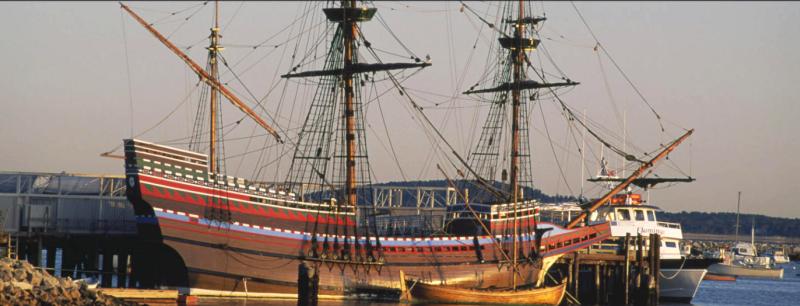 On the upcoming 400th anniversary of the arrival of the Pilgrims on the Mayflower, the ongoing pandemic has seriously disrupted plans for the commemoration. The replica ship Mayflower II has returned to its homeport in Plymouth, MA, after completing an $11 million refit at the Mystic Seaport Museum’s duPont Preservation Shipyard. But, the art exhibits, festivals, lectures, and regattas planned to celebrate the anniversary have all been scaled back, put on hold, or canceled altogether.
On the upcoming 400th anniversary of the arrival of the Pilgrims on the Mayflower, the ongoing pandemic has seriously disrupted plans for the commemoration. The replica ship Mayflower II has returned to its homeport in Plymouth, MA, after completing an $11 million refit at the Mystic Seaport Museum’s duPont Preservation Shipyard. But, the art exhibits, festivals, lectures, and regattas planned to celebrate the anniversary have all been scaled back, put on hold, or canceled altogether.
The Boston Globe reports that some find irony in the coincidence of the pandemic with the anniversary. They note that historian Elizabeth Fenn finds a certain perverse poetry in that.
“The irony obviously runs quite deep,” says Fenn, a history professor at the University of Colorado Boulder who has studied disease in Colonial America. “Novel infections did MOST of the dirty work of colonization.”
Disease introduced by traders and settlers — either by happenstance or intention — played a significant role in the “conquest” of Native people. And that inconvenient fact, well known to the Natives’ descendants, is contrary to the traditional narrative of the “New World.”
The Pilgrims on the Mayflower, however, were not the first to bring deadly contagion to the Native peoples. European fishermen brought an unknown disease that wholly devastated New England tribes prior to the Mayflower‘s arrival.
“Portions of coastal New England that had once been as densely populated as western Europe were suddenly empty of people, with only the whitened bones of the dead to indicate that a thriving community had once existed along these shores,” Nathaniel Philbrick wrote in his 2006 bestseller, “Mayflower.”
In an article in last winter’s Historical Journal of Massachusetts, Dr. John Booss of the Yale University School of Medicine argued that the “exquisite timing” of the Pilgrims’ arrival in the wake of a deadly epidemic was one of the key factors in the colony’s success.
“We are left with a tragic and paradoxical conclusion: Lethality in one population proved to be the means of survival for another group,” Booss wrote. “Without the intercession of a highly lethal, geographically focused and time-specific epidemic among the Wampanoag, the history of the Pilgrims, New England, and the mythos of America might have been very different.”

It’s at Plymouth, MA. MS is Mississippi.
Thanks. Fixed it.